Bachelor of Nursing Assignment: Healthcare, Ethics, and Practice
VerifiedAdded on 2020/03/04
|10
|2569
|47
Essay
AI Summary
This Bachelor of Nursing assignment delves into the multifaceted world of nursing, emphasizing its crucial role in healthcare. The essay defines nursing as a noble profession dedicated to patient well-being across diverse demographics, highlighting the importance of ethical practices, patient advocacy, and continuous learning. It explores key concepts, nursing theories like Orlando’s Deliberative Nursing Process, and the significance of adhering to ethical and legal guidelines, including the New Zealand Nurses Organisation's code of ethics. The assignment also examines nursing competencies, the domains of practice, and the influence of historical events like the Treaty of Waitangi on the profession in New Zealand. The author reflects on the challenges and opportunities within nursing, emphasizing the importance of critical reflection and pragmatic knowledge in delivering quality patient care and advocating for culturally safe healthcare facilities.
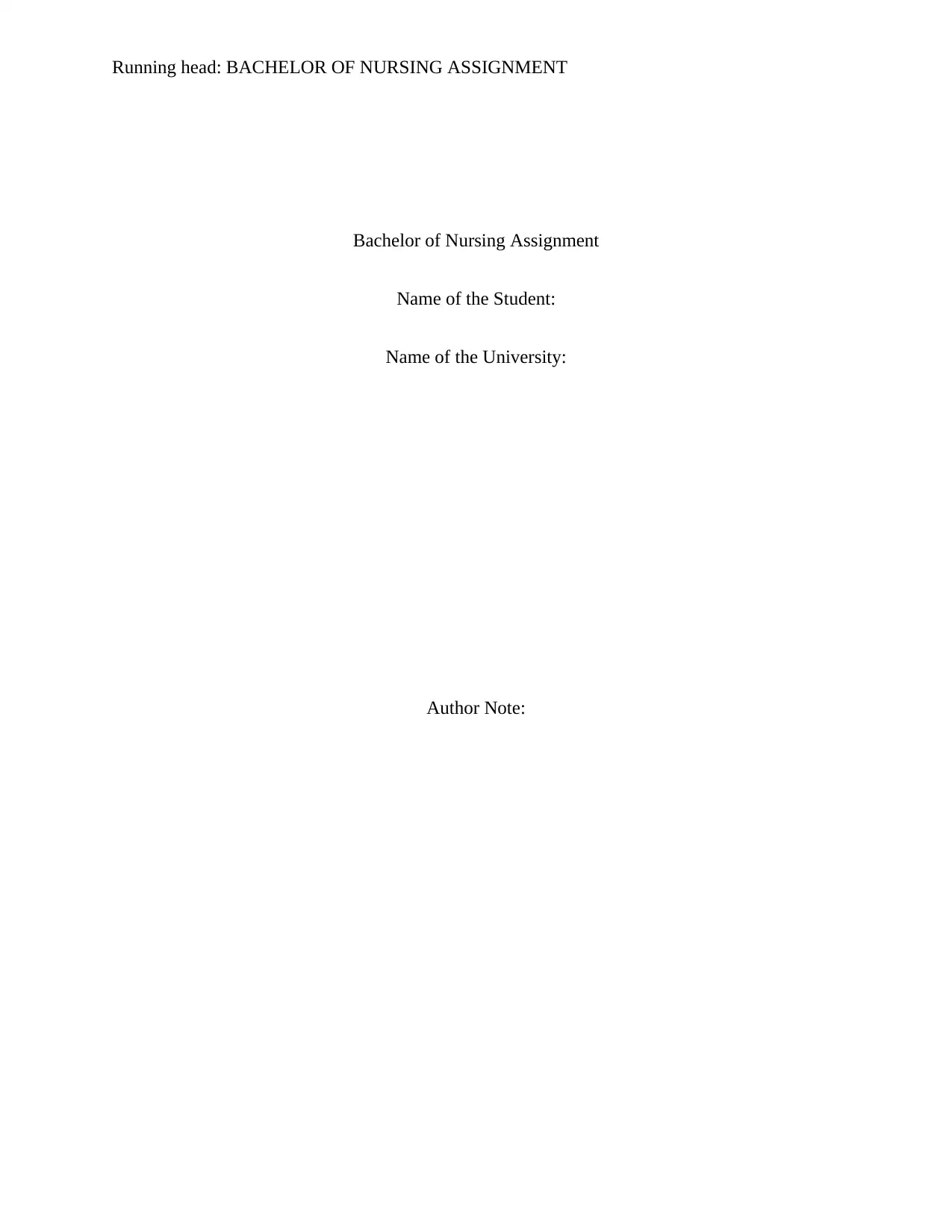
Running head: BACHELOR OF NURSING ASSIGNMENT
Bachelor of Nursing Assignment
Name of the Student:
Name of the University:
Author Note:
Bachelor of Nursing Assignment
Name of the Student:
Name of the University:
Author Note:
Paraphrase This Document
Need a fresh take? Get an instant paraphrase of this document with our AI Paraphraser
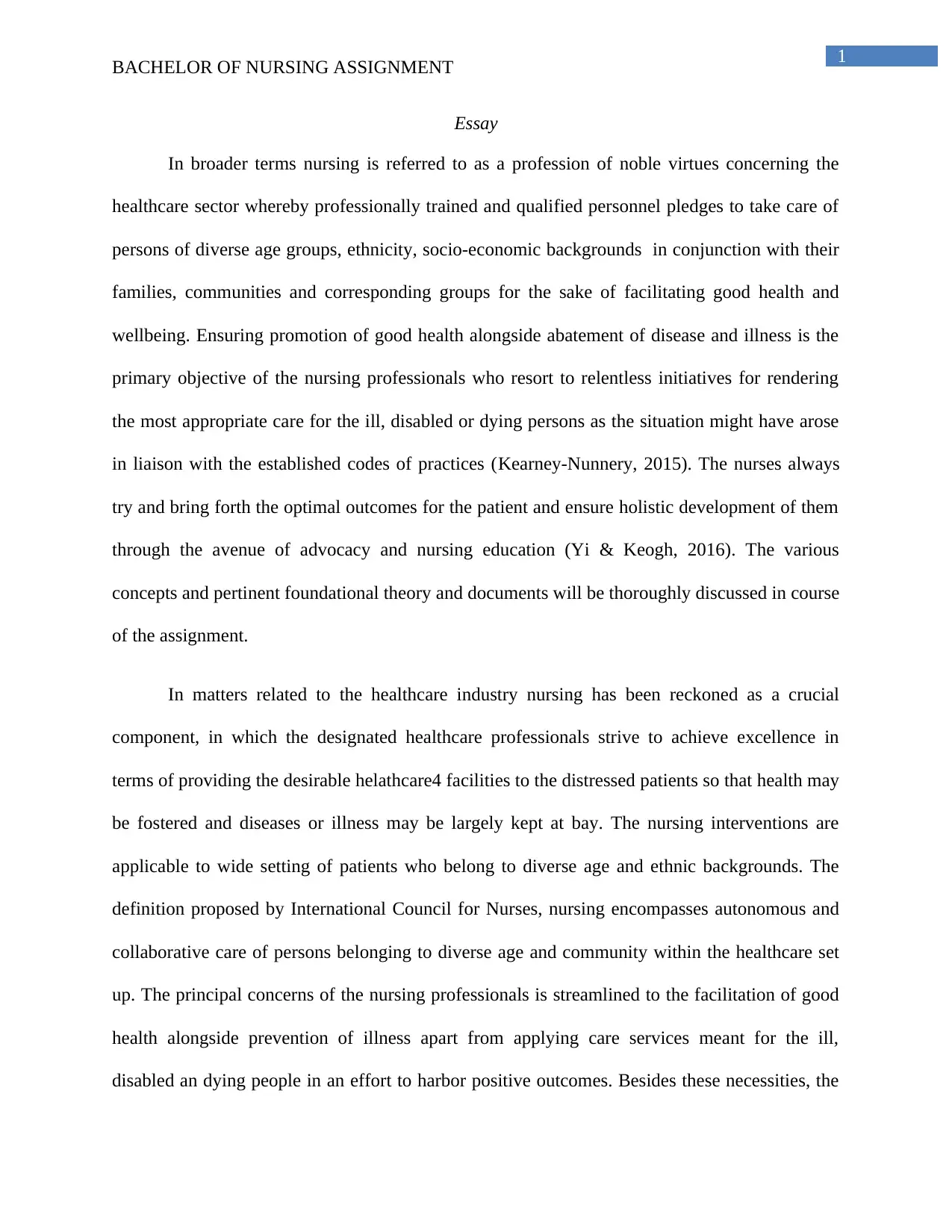
1
BACHELOR OF NURSING ASSIGNMENT
Essay
In broader terms nursing is referred to as a profession of noble virtues concerning the
healthcare sector whereby professionally trained and qualified personnel pledges to take care of
persons of diverse age groups, ethnicity, socio-economic backgrounds in conjunction with their
families, communities and corresponding groups for the sake of facilitating good health and
wellbeing. Ensuring promotion of good health alongside abatement of disease and illness is the
primary objective of the nursing professionals who resort to relentless initiatives for rendering
the most appropriate care for the ill, disabled or dying persons as the situation might have arose
in liaison with the established codes of practices (Kearney-Nunnery, 2015). The nurses always
try and bring forth the optimal outcomes for the patient and ensure holistic development of them
through the avenue of advocacy and nursing education (Yi & Keogh, 2016). The various
concepts and pertinent foundational theory and documents will be thoroughly discussed in course
of the assignment.
In matters related to the healthcare industry nursing has been reckoned as a crucial
component, in which the designated healthcare professionals strive to achieve excellence in
terms of providing the desirable helathcare4 facilities to the distressed patients so that health may
be fostered and diseases or illness may be largely kept at bay. The nursing interventions are
applicable to wide setting of patients who belong to diverse age and ethnic backgrounds. The
definition proposed by International Council for Nurses, nursing encompasses autonomous and
collaborative care of persons belonging to diverse age and community within the healthcare set
up. The principal concerns of the nursing professionals is streamlined to the facilitation of good
health alongside prevention of illness apart from applying care services meant for the ill,
disabled an dying people in an effort to harbor positive outcomes. Besides these necessities, the
BACHELOR OF NURSING ASSIGNMENT
Essay
In broader terms nursing is referred to as a profession of noble virtues concerning the
healthcare sector whereby professionally trained and qualified personnel pledges to take care of
persons of diverse age groups, ethnicity, socio-economic backgrounds in conjunction with their
families, communities and corresponding groups for the sake of facilitating good health and
wellbeing. Ensuring promotion of good health alongside abatement of disease and illness is the
primary objective of the nursing professionals who resort to relentless initiatives for rendering
the most appropriate care for the ill, disabled or dying persons as the situation might have arose
in liaison with the established codes of practices (Kearney-Nunnery, 2015). The nurses always
try and bring forth the optimal outcomes for the patient and ensure holistic development of them
through the avenue of advocacy and nursing education (Yi & Keogh, 2016). The various
concepts and pertinent foundational theory and documents will be thoroughly discussed in course
of the assignment.
In matters related to the healthcare industry nursing has been reckoned as a crucial
component, in which the designated healthcare professionals strive to achieve excellence in
terms of providing the desirable helathcare4 facilities to the distressed patients so that health may
be fostered and diseases or illness may be largely kept at bay. The nursing interventions are
applicable to wide setting of patients who belong to diverse age and ethnic backgrounds. The
definition proposed by International Council for Nurses, nursing encompasses autonomous and
collaborative care of persons belonging to diverse age and community within the healthcare set
up. The principal concerns of the nursing professionals is streamlined to the facilitation of good
health alongside prevention of illness apart from applying care services meant for the ill,
disabled an dying people in an effort to harbor positive outcomes. Besides these necessities, the
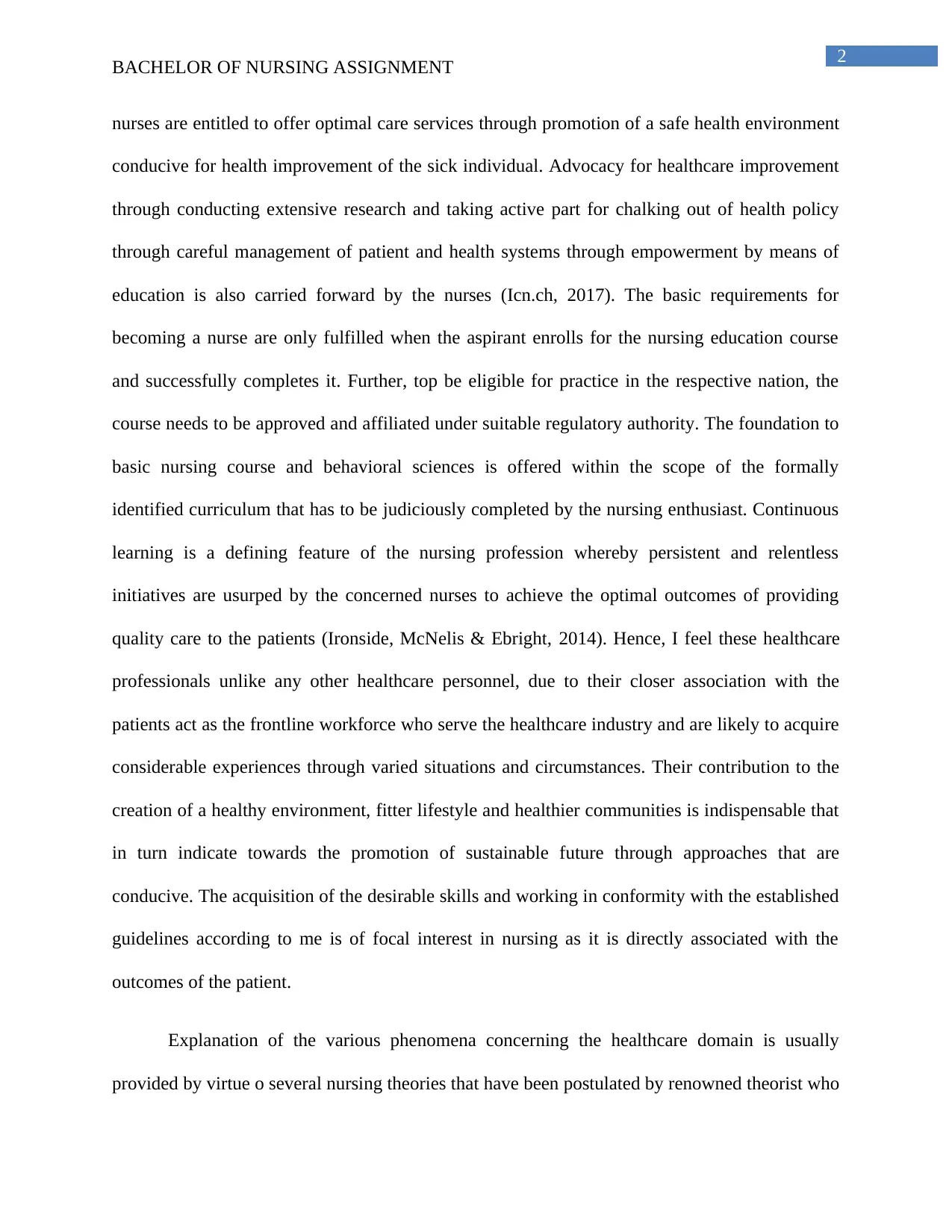
2
BACHELOR OF NURSING ASSIGNMENT
nurses are entitled to offer optimal care services through promotion of a safe health environment
conducive for health improvement of the sick individual. Advocacy for healthcare improvement
through conducting extensive research and taking active part for chalking out of health policy
through careful management of patient and health systems through empowerment by means of
education is also carried forward by the nurses (Icn.ch, 2017). The basic requirements for
becoming a nurse are only fulfilled when the aspirant enrolls for the nursing education course
and successfully completes it. Further, top be eligible for practice in the respective nation, the
course needs to be approved and affiliated under suitable regulatory authority. The foundation to
basic nursing course and behavioral sciences is offered within the scope of the formally
identified curriculum that has to be judiciously completed by the nursing enthusiast. Continuous
learning is a defining feature of the nursing profession whereby persistent and relentless
initiatives are usurped by the concerned nurses to achieve the optimal outcomes of providing
quality care to the patients (Ironside, McNelis & Ebright, 2014). Hence, I feel these healthcare
professionals unlike any other healthcare personnel, due to their closer association with the
patients act as the frontline workforce who serve the healthcare industry and are likely to acquire
considerable experiences through varied situations and circumstances. Their contribution to the
creation of a healthy environment, fitter lifestyle and healthier communities is indispensable that
in turn indicate towards the promotion of sustainable future through approaches that are
conducive. The acquisition of the desirable skills and working in conformity with the established
guidelines according to me is of focal interest in nursing as it is directly associated with the
outcomes of the patient.
Explanation of the various phenomena concerning the healthcare domain is usually
provided by virtue o several nursing theories that have been postulated by renowned theorist who
BACHELOR OF NURSING ASSIGNMENT
nurses are entitled to offer optimal care services through promotion of a safe health environment
conducive for health improvement of the sick individual. Advocacy for healthcare improvement
through conducting extensive research and taking active part for chalking out of health policy
through careful management of patient and health systems through empowerment by means of
education is also carried forward by the nurses (Icn.ch, 2017). The basic requirements for
becoming a nurse are only fulfilled when the aspirant enrolls for the nursing education course
and successfully completes it. Further, top be eligible for practice in the respective nation, the
course needs to be approved and affiliated under suitable regulatory authority. The foundation to
basic nursing course and behavioral sciences is offered within the scope of the formally
identified curriculum that has to be judiciously completed by the nursing enthusiast. Continuous
learning is a defining feature of the nursing profession whereby persistent and relentless
initiatives are usurped by the concerned nurses to achieve the optimal outcomes of providing
quality care to the patients (Ironside, McNelis & Ebright, 2014). Hence, I feel these healthcare
professionals unlike any other healthcare personnel, due to their closer association with the
patients act as the frontline workforce who serve the healthcare industry and are likely to acquire
considerable experiences through varied situations and circumstances. Their contribution to the
creation of a healthy environment, fitter lifestyle and healthier communities is indispensable that
in turn indicate towards the promotion of sustainable future through approaches that are
conducive. The acquisition of the desirable skills and working in conformity with the established
guidelines according to me is of focal interest in nursing as it is directly associated with the
outcomes of the patient.
Explanation of the various phenomena concerning the healthcare domain is usually
provided by virtue o several nursing theories that have been postulated by renowned theorist who
⊘ This is a preview!⊘
Do you want full access?
Subscribe today to unlock all pages.

Trusted by 1+ million students worldwide
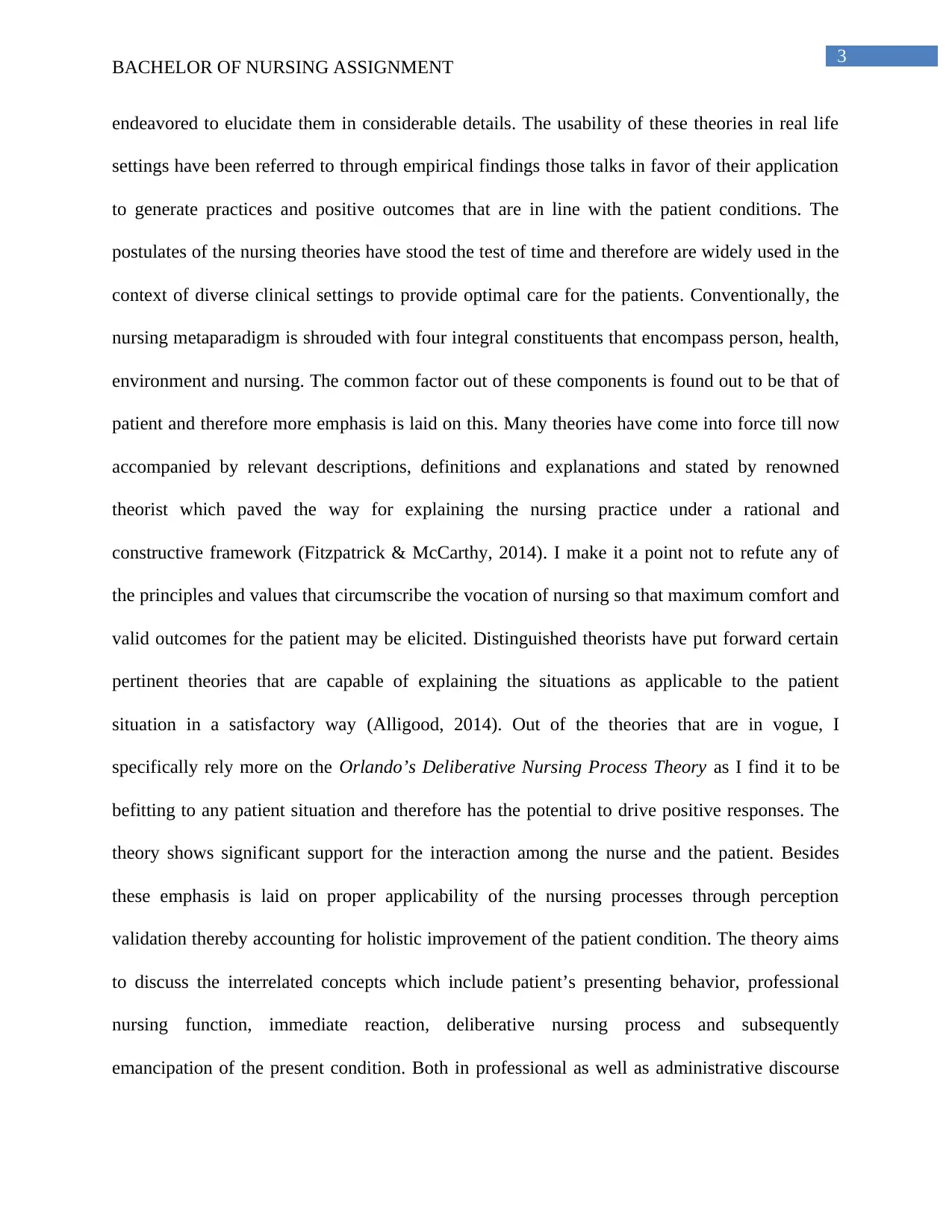
3
BACHELOR OF NURSING ASSIGNMENT
endeavored to elucidate them in considerable details. The usability of these theories in real life
settings have been referred to through empirical findings those talks in favor of their application
to generate practices and positive outcomes that are in line with the patient conditions. The
postulates of the nursing theories have stood the test of time and therefore are widely used in the
context of diverse clinical settings to provide optimal care for the patients. Conventionally, the
nursing metaparadigm is shrouded with four integral constituents that encompass person, health,
environment and nursing. The common factor out of these components is found out to be that of
patient and therefore more emphasis is laid on this. Many theories have come into force till now
accompanied by relevant descriptions, definitions and explanations and stated by renowned
theorist which paved the way for explaining the nursing practice under a rational and
constructive framework (Fitzpatrick & McCarthy, 2014). I make it a point not to refute any of
the principles and values that circumscribe the vocation of nursing so that maximum comfort and
valid outcomes for the patient may be elicited. Distinguished theorists have put forward certain
pertinent theories that are capable of explaining the situations as applicable to the patient
situation in a satisfactory way (Alligood, 2014). Out of the theories that are in vogue, I
specifically rely more on the Orlando’s Deliberative Nursing Process Theory as I find it to be
befitting to any patient situation and therefore has the potential to drive positive responses. The
theory shows significant support for the interaction among the nurse and the patient. Besides
these emphasis is laid on proper applicability of the nursing processes through perception
validation thereby accounting for holistic improvement of the patient condition. The theory aims
to discuss the interrelated concepts which include patient’s presenting behavior, professional
nursing function, immediate reaction, deliberative nursing process and subsequently
emancipation of the present condition. Both in professional as well as administrative discourse
BACHELOR OF NURSING ASSIGNMENT
endeavored to elucidate them in considerable details. The usability of these theories in real life
settings have been referred to through empirical findings those talks in favor of their application
to generate practices and positive outcomes that are in line with the patient conditions. The
postulates of the nursing theories have stood the test of time and therefore are widely used in the
context of diverse clinical settings to provide optimal care for the patients. Conventionally, the
nursing metaparadigm is shrouded with four integral constituents that encompass person, health,
environment and nursing. The common factor out of these components is found out to be that of
patient and therefore more emphasis is laid on this. Many theories have come into force till now
accompanied by relevant descriptions, definitions and explanations and stated by renowned
theorist which paved the way for explaining the nursing practice under a rational and
constructive framework (Fitzpatrick & McCarthy, 2014). I make it a point not to refute any of
the principles and values that circumscribe the vocation of nursing so that maximum comfort and
valid outcomes for the patient may be elicited. Distinguished theorists have put forward certain
pertinent theories that are capable of explaining the situations as applicable to the patient
situation in a satisfactory way (Alligood, 2014). Out of the theories that are in vogue, I
specifically rely more on the Orlando’s Deliberative Nursing Process Theory as I find it to be
befitting to any patient situation and therefore has the potential to drive positive responses. The
theory shows significant support for the interaction among the nurse and the patient. Besides
these emphasis is laid on proper applicability of the nursing processes through perception
validation thereby accounting for holistic improvement of the patient condition. The theory aims
to discuss the interrelated concepts which include patient’s presenting behavior, professional
nursing function, immediate reaction, deliberative nursing process and subsequently
emancipation of the present condition. Both in professional as well as administrative discourse
Paraphrase This Document
Need a fresh take? Get an instant paraphrase of this document with our AI Paraphraser
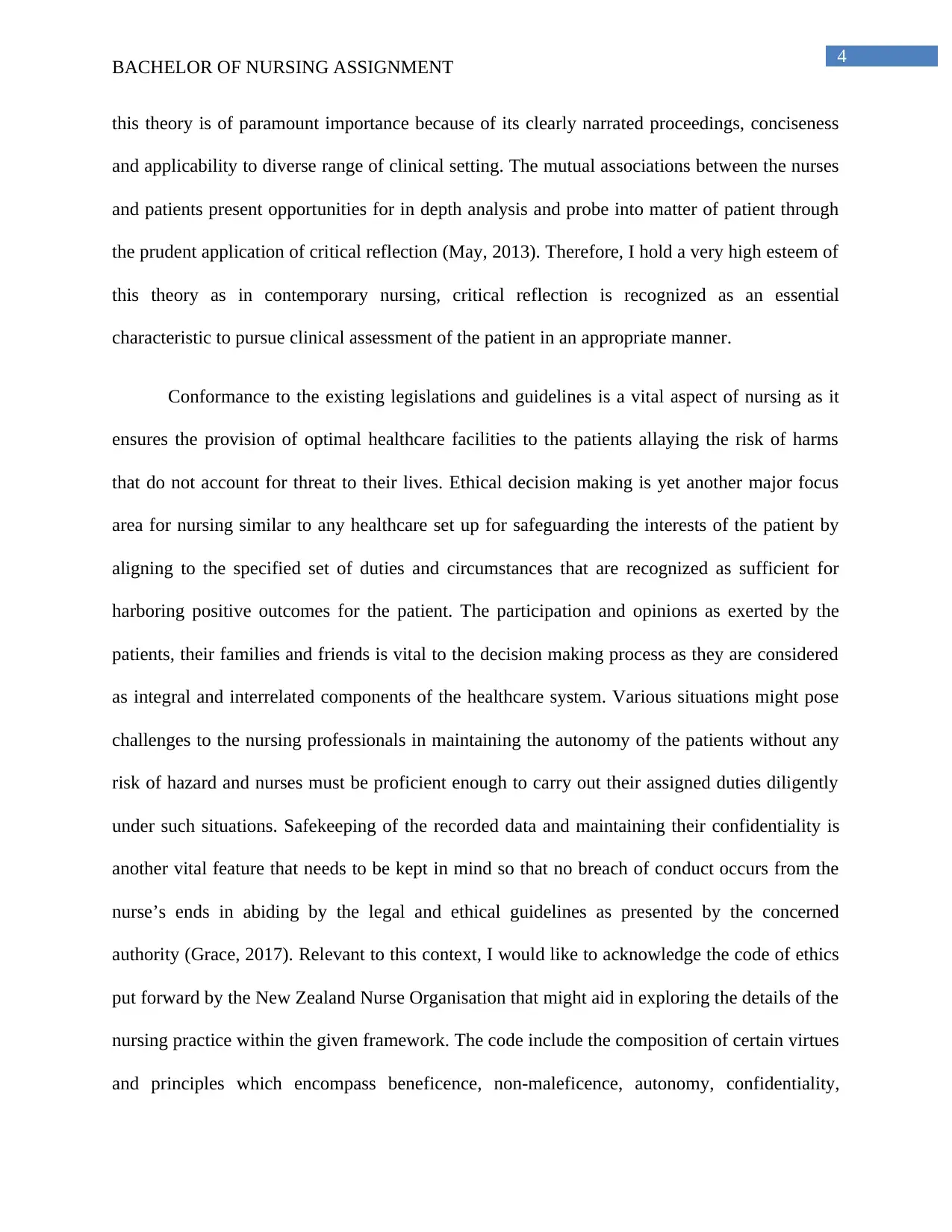
4
BACHELOR OF NURSING ASSIGNMENT
this theory is of paramount importance because of its clearly narrated proceedings, conciseness
and applicability to diverse range of clinical setting. The mutual associations between the nurses
and patients present opportunities for in depth analysis and probe into matter of patient through
the prudent application of critical reflection (May, 2013). Therefore, I hold a very high esteem of
this theory as in contemporary nursing, critical reflection is recognized as an essential
characteristic to pursue clinical assessment of the patient in an appropriate manner.
Conformance to the existing legislations and guidelines is a vital aspect of nursing as it
ensures the provision of optimal healthcare facilities to the patients allaying the risk of harms
that do not account for threat to their lives. Ethical decision making is yet another major focus
area for nursing similar to any healthcare set up for safeguarding the interests of the patient by
aligning to the specified set of duties and circumstances that are recognized as sufficient for
harboring positive outcomes for the patient. The participation and opinions as exerted by the
patients, their families and friends is vital to the decision making process as they are considered
as integral and interrelated components of the healthcare system. Various situations might pose
challenges to the nursing professionals in maintaining the autonomy of the patients without any
risk of hazard and nurses must be proficient enough to carry out their assigned duties diligently
under such situations. Safekeeping of the recorded data and maintaining their confidentiality is
another vital feature that needs to be kept in mind so that no breach of conduct occurs from the
nurse’s ends in abiding by the legal and ethical guidelines as presented by the concerned
authority (Grace, 2017). Relevant to this context, I would like to acknowledge the code of ethics
put forward by the New Zealand Nurse Organisation that might aid in exploring the details of the
nursing practice within the given framework. The code include the composition of certain virtues
and principles which encompass beneficence, non-maleficence, autonomy, confidentiality,
BACHELOR OF NURSING ASSIGNMENT
this theory is of paramount importance because of its clearly narrated proceedings, conciseness
and applicability to diverse range of clinical setting. The mutual associations between the nurses
and patients present opportunities for in depth analysis and probe into matter of patient through
the prudent application of critical reflection (May, 2013). Therefore, I hold a very high esteem of
this theory as in contemporary nursing, critical reflection is recognized as an essential
characteristic to pursue clinical assessment of the patient in an appropriate manner.
Conformance to the existing legislations and guidelines is a vital aspect of nursing as it
ensures the provision of optimal healthcare facilities to the patients allaying the risk of harms
that do not account for threat to their lives. Ethical decision making is yet another major focus
area for nursing similar to any healthcare set up for safeguarding the interests of the patient by
aligning to the specified set of duties and circumstances that are recognized as sufficient for
harboring positive outcomes for the patient. The participation and opinions as exerted by the
patients, their families and friends is vital to the decision making process as they are considered
as integral and interrelated components of the healthcare system. Various situations might pose
challenges to the nursing professionals in maintaining the autonomy of the patients without any
risk of hazard and nurses must be proficient enough to carry out their assigned duties diligently
under such situations. Safekeeping of the recorded data and maintaining their confidentiality is
another vital feature that needs to be kept in mind so that no breach of conduct occurs from the
nurse’s ends in abiding by the legal and ethical guidelines as presented by the concerned
authority (Grace, 2017). Relevant to this context, I would like to acknowledge the code of ethics
put forward by the New Zealand Nurse Organisation that might aid in exploring the details of the
nursing practice within the given framework. The code include the composition of certain virtues
and principles which encompass beneficence, non-maleficence, autonomy, confidentiality,
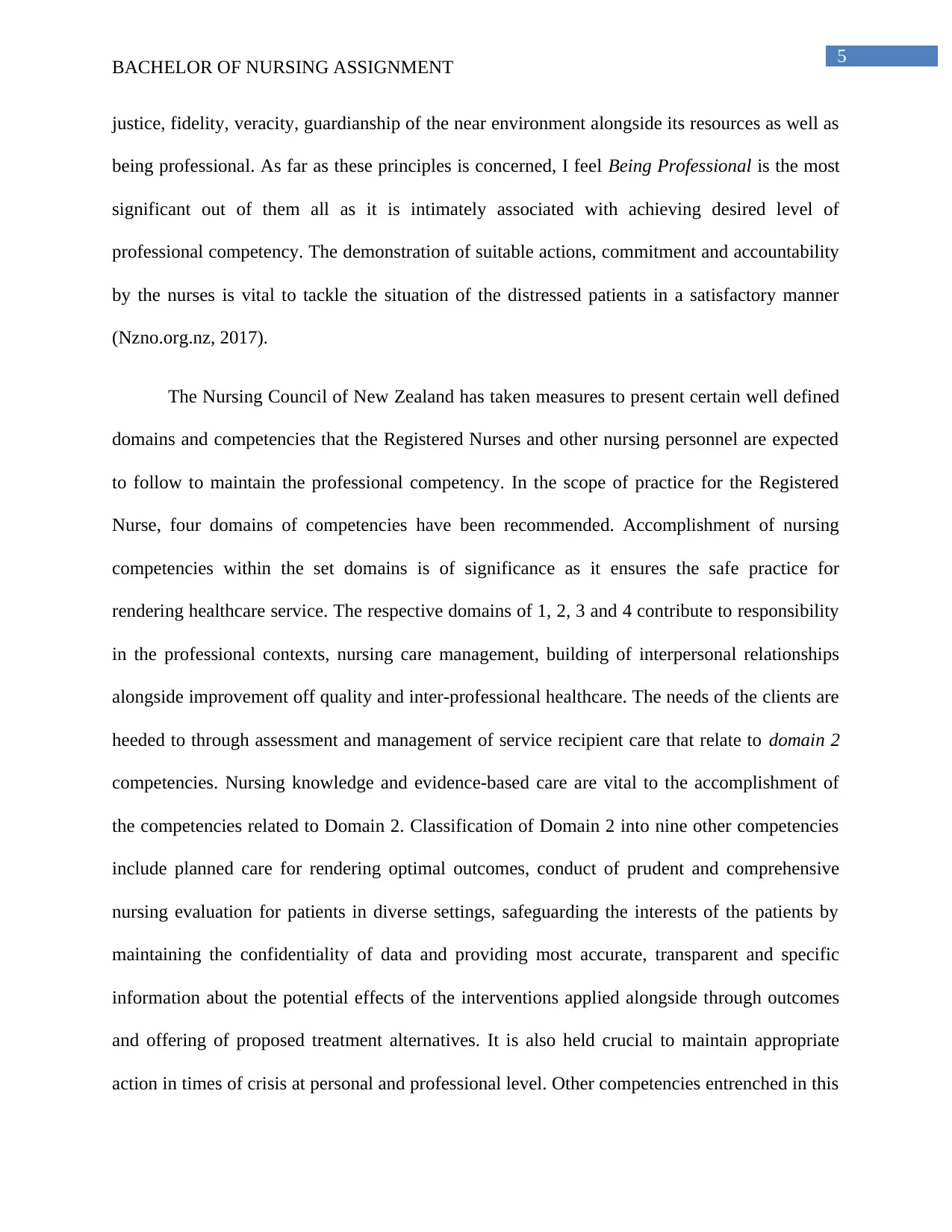
5
BACHELOR OF NURSING ASSIGNMENT
justice, fidelity, veracity, guardianship of the near environment alongside its resources as well as
being professional. As far as these principles is concerned, I feel Being Professional is the most
significant out of them all as it is intimately associated with achieving desired level of
professional competency. The demonstration of suitable actions, commitment and accountability
by the nurses is vital to tackle the situation of the distressed patients in a satisfactory manner
(Nzno.org.nz, 2017).
The Nursing Council of New Zealand has taken measures to present certain well defined
domains and competencies that the Registered Nurses and other nursing personnel are expected
to follow to maintain the professional competency. In the scope of practice for the Registered
Nurse, four domains of competencies have been recommended. Accomplishment of nursing
competencies within the set domains is of significance as it ensures the safe practice for
rendering healthcare service. The respective domains of 1, 2, 3 and 4 contribute to responsibility
in the professional contexts, nursing care management, building of interpersonal relationships
alongside improvement off quality and inter-professional healthcare. The needs of the clients are
heeded to through assessment and management of service recipient care that relate to domain 2
competencies. Nursing knowledge and evidence-based care are vital to the accomplishment of
the competencies related to Domain 2. Classification of Domain 2 into nine other competencies
include planned care for rendering optimal outcomes, conduct of prudent and comprehensive
nursing evaluation for patients in diverse settings, safeguarding the interests of the patients by
maintaining the confidentiality of data and providing most accurate, transparent and specific
information about the potential effects of the interventions applied alongside through outcomes
and offering of proposed treatment alternatives. It is also held crucial to maintain appropriate
action in times of crisis at personal and professional level. Other competencies entrenched in this
BACHELOR OF NURSING ASSIGNMENT
justice, fidelity, veracity, guardianship of the near environment alongside its resources as well as
being professional. As far as these principles is concerned, I feel Being Professional is the most
significant out of them all as it is intimately associated with achieving desired level of
professional competency. The demonstration of suitable actions, commitment and accountability
by the nurses is vital to tackle the situation of the distressed patients in a satisfactory manner
(Nzno.org.nz, 2017).
The Nursing Council of New Zealand has taken measures to present certain well defined
domains and competencies that the Registered Nurses and other nursing personnel are expected
to follow to maintain the professional competency. In the scope of practice for the Registered
Nurse, four domains of competencies have been recommended. Accomplishment of nursing
competencies within the set domains is of significance as it ensures the safe practice for
rendering healthcare service. The respective domains of 1, 2, 3 and 4 contribute to responsibility
in the professional contexts, nursing care management, building of interpersonal relationships
alongside improvement off quality and inter-professional healthcare. The needs of the clients are
heeded to through assessment and management of service recipient care that relate to domain 2
competencies. Nursing knowledge and evidence-based care are vital to the accomplishment of
the competencies related to Domain 2. Classification of Domain 2 into nine other competencies
include planned care for rendering optimal outcomes, conduct of prudent and comprehensive
nursing evaluation for patients in diverse settings, safeguarding the interests of the patients by
maintaining the confidentiality of data and providing most accurate, transparent and specific
information about the potential effects of the interventions applied alongside through outcomes
and offering of proposed treatment alternatives. It is also held crucial to maintain appropriate
action in times of crisis at personal and professional level. Other competencies entrenched in this
⊘ This is a preview!⊘
Do you want full access?
Subscribe today to unlock all pages.

Trusted by 1+ million students worldwide
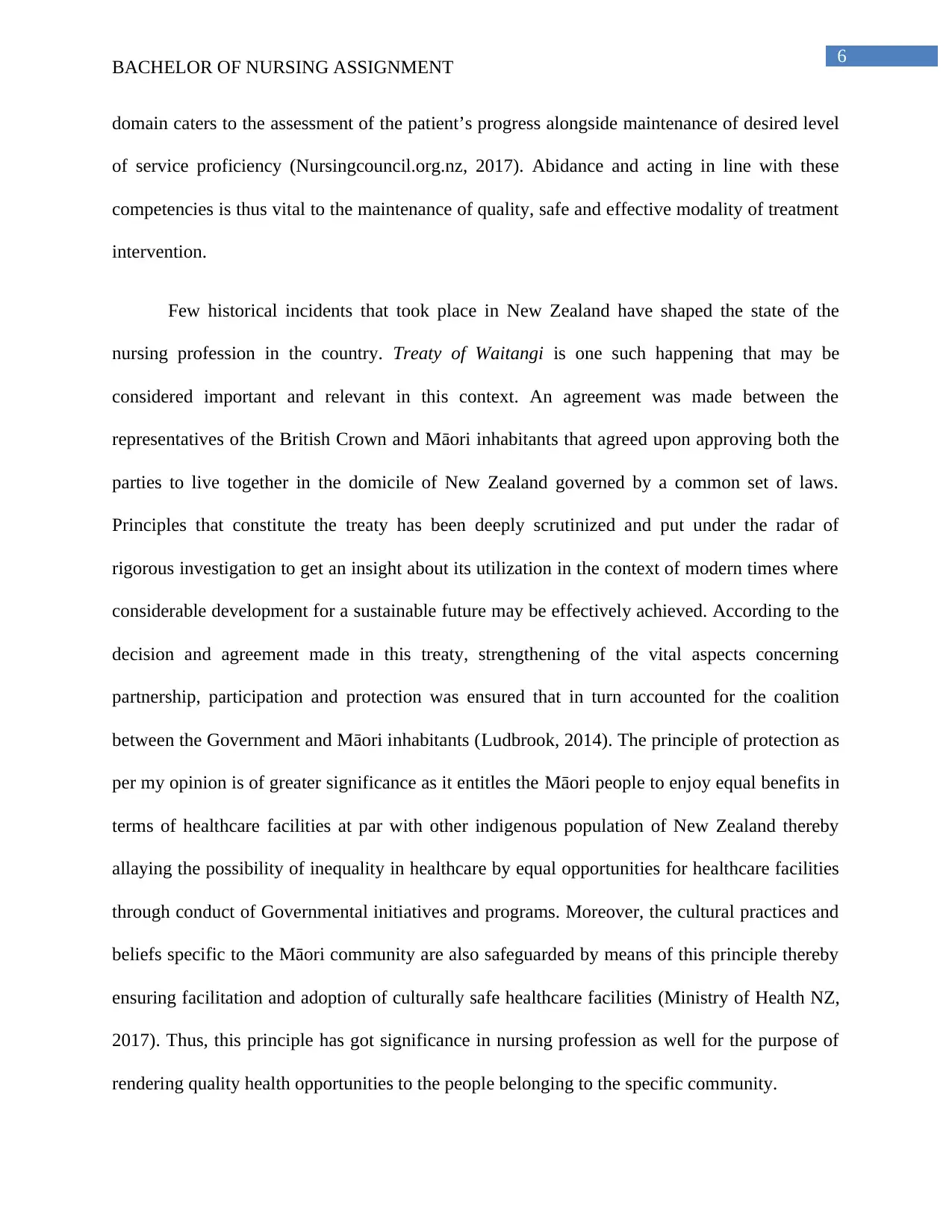
6
BACHELOR OF NURSING ASSIGNMENT
domain caters to the assessment of the patient’s progress alongside maintenance of desired level
of service proficiency (Nursingcouncil.org.nz, 2017). Abidance and acting in line with these
competencies is thus vital to the maintenance of quality, safe and effective modality of treatment
intervention.
Few historical incidents that took place in New Zealand have shaped the state of the
nursing profession in the country. Treaty of Waitangi is one such happening that may be
considered important and relevant in this context. An agreement was made between the
representatives of the British Crown and Māori inhabitants that agreed upon approving both the
parties to live together in the domicile of New Zealand governed by a common set of laws.
Principles that constitute the treaty has been deeply scrutinized and put under the radar of
rigorous investigation to get an insight about its utilization in the context of modern times where
considerable development for a sustainable future may be effectively achieved. According to the
decision and agreement made in this treaty, strengthening of the vital aspects concerning
partnership, participation and protection was ensured that in turn accounted for the coalition
between the Government and Māori inhabitants (Ludbrook, 2014). The principle of protection as
per my opinion is of greater significance as it entitles the Māori people to enjoy equal benefits in
terms of healthcare facilities at par with other indigenous population of New Zealand thereby
allaying the possibility of inequality in healthcare by equal opportunities for healthcare facilities
through conduct of Governmental initiatives and programs. Moreover, the cultural practices and
beliefs specific to the Māori community are also safeguarded by means of this principle thereby
ensuring facilitation and adoption of culturally safe healthcare facilities (Ministry of Health NZ,
2017). Thus, this principle has got significance in nursing profession as well for the purpose of
rendering quality health opportunities to the people belonging to the specific community.
BACHELOR OF NURSING ASSIGNMENT
domain caters to the assessment of the patient’s progress alongside maintenance of desired level
of service proficiency (Nursingcouncil.org.nz, 2017). Abidance and acting in line with these
competencies is thus vital to the maintenance of quality, safe and effective modality of treatment
intervention.
Few historical incidents that took place in New Zealand have shaped the state of the
nursing profession in the country. Treaty of Waitangi is one such happening that may be
considered important and relevant in this context. An agreement was made between the
representatives of the British Crown and Māori inhabitants that agreed upon approving both the
parties to live together in the domicile of New Zealand governed by a common set of laws.
Principles that constitute the treaty has been deeply scrutinized and put under the radar of
rigorous investigation to get an insight about its utilization in the context of modern times where
considerable development for a sustainable future may be effectively achieved. According to the
decision and agreement made in this treaty, strengthening of the vital aspects concerning
partnership, participation and protection was ensured that in turn accounted for the coalition
between the Government and Māori inhabitants (Ludbrook, 2014). The principle of protection as
per my opinion is of greater significance as it entitles the Māori people to enjoy equal benefits in
terms of healthcare facilities at par with other indigenous population of New Zealand thereby
allaying the possibility of inequality in healthcare by equal opportunities for healthcare facilities
through conduct of Governmental initiatives and programs. Moreover, the cultural practices and
beliefs specific to the Māori community are also safeguarded by means of this principle thereby
ensuring facilitation and adoption of culturally safe healthcare facilities (Ministry of Health NZ,
2017). Thus, this principle has got significance in nursing profession as well for the purpose of
rendering quality health opportunities to the people belonging to the specific community.
Paraphrase This Document
Need a fresh take? Get an instant paraphrase of this document with our AI Paraphraser
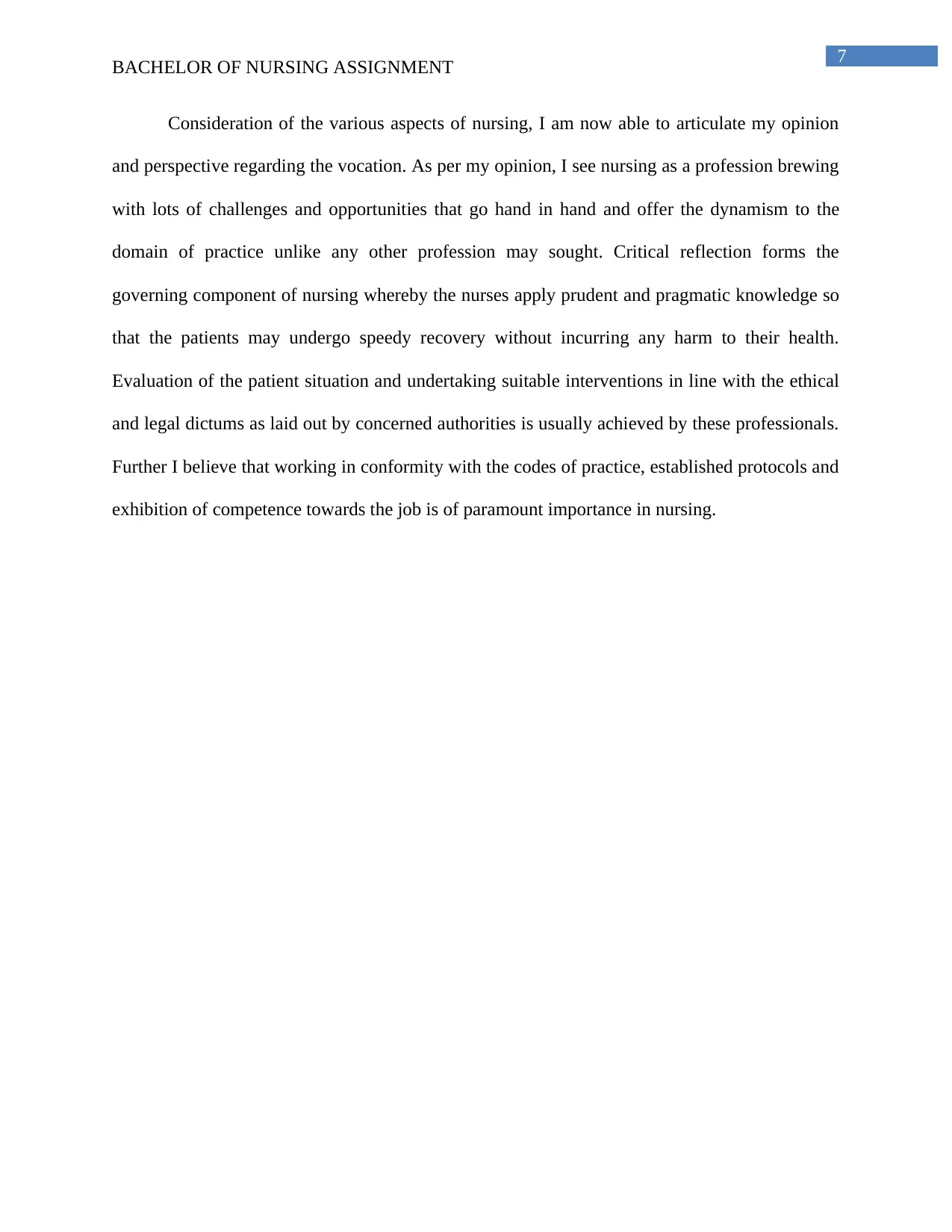
7
BACHELOR OF NURSING ASSIGNMENT
Consideration of the various aspects of nursing, I am now able to articulate my opinion
and perspective regarding the vocation. As per my opinion, I see nursing as a profession brewing
with lots of challenges and opportunities that go hand in hand and offer the dynamism to the
domain of practice unlike any other profession may sought. Critical reflection forms the
governing component of nursing whereby the nurses apply prudent and pragmatic knowledge so
that the patients may undergo speedy recovery without incurring any harm to their health.
Evaluation of the patient situation and undertaking suitable interventions in line with the ethical
and legal dictums as laid out by concerned authorities is usually achieved by these professionals.
Further I believe that working in conformity with the codes of practice, established protocols and
exhibition of competence towards the job is of paramount importance in nursing.
BACHELOR OF NURSING ASSIGNMENT
Consideration of the various aspects of nursing, I am now able to articulate my opinion
and perspective regarding the vocation. As per my opinion, I see nursing as a profession brewing
with lots of challenges and opportunities that go hand in hand and offer the dynamism to the
domain of practice unlike any other profession may sought. Critical reflection forms the
governing component of nursing whereby the nurses apply prudent and pragmatic knowledge so
that the patients may undergo speedy recovery without incurring any harm to their health.
Evaluation of the patient situation and undertaking suitable interventions in line with the ethical
and legal dictums as laid out by concerned authorities is usually achieved by these professionals.
Further I believe that working in conformity with the codes of practice, established protocols and
exhibition of competence towards the job is of paramount importance in nursing.
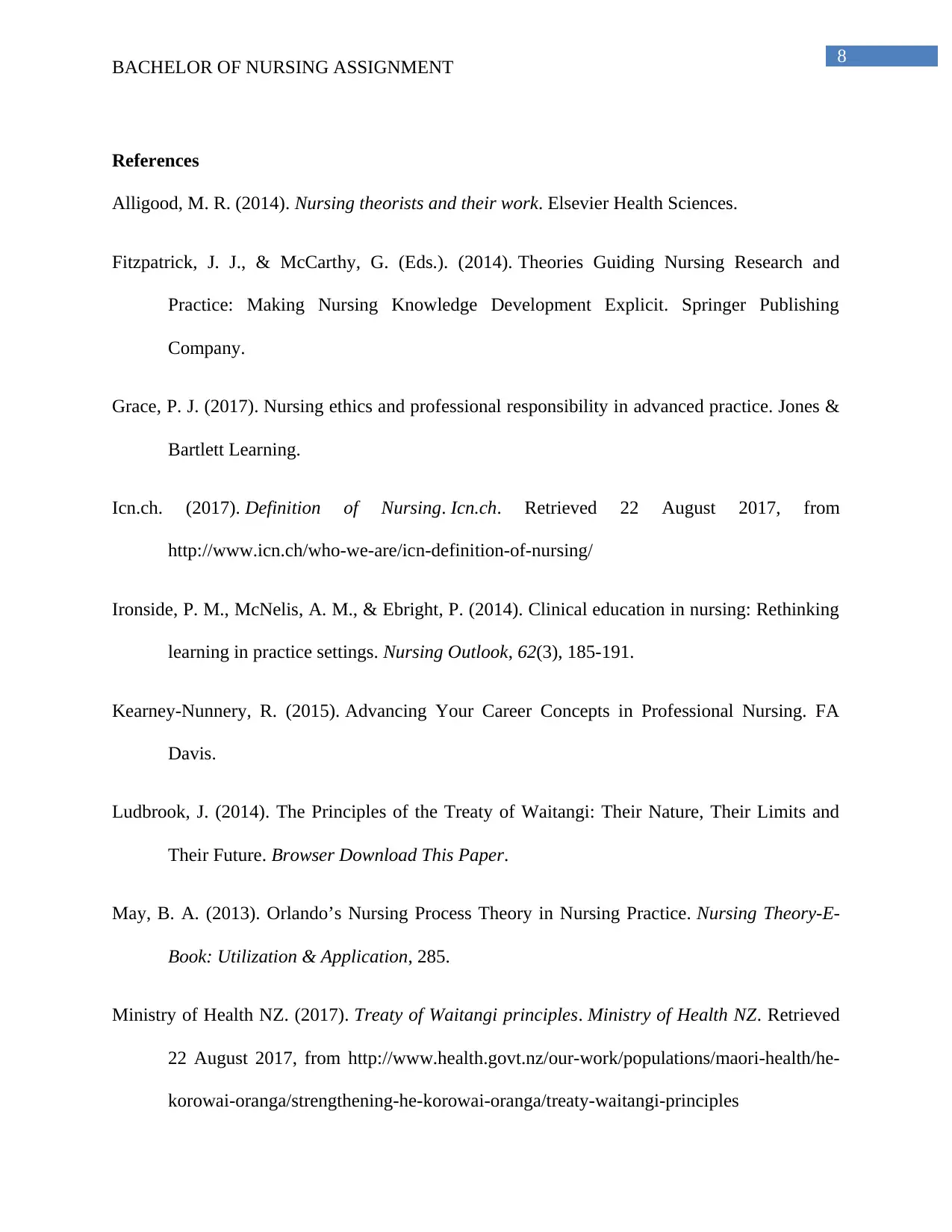
8
BACHELOR OF NURSING ASSIGNMENT
References
Alligood, M. R. (2014). Nursing theorists and their work. Elsevier Health Sciences.
Fitzpatrick, J. J., & McCarthy, G. (Eds.). (2014). Theories Guiding Nursing Research and
Practice: Making Nursing Knowledge Development Explicit. Springer Publishing
Company.
Grace, P. J. (2017). Nursing ethics and professional responsibility in advanced practice. Jones &
Bartlett Learning.
Icn.ch. (2017). Definition of Nursing. Icn.ch. Retrieved 22 August 2017, from
http://www.icn.ch/who-we-are/icn-definition-of-nursing/
Ironside, P. M., McNelis, A. M., & Ebright, P. (2014). Clinical education in nursing: Rethinking
learning in practice settings. Nursing Outlook, 62(3), 185-191.
Kearney-Nunnery, R. (2015). Advancing Your Career Concepts in Professional Nursing. FA
Davis.
Ludbrook, J. (2014). The Principles of the Treaty of Waitangi: Their Nature, Their Limits and
Their Future. Browser Download This Paper.
May, B. A. (2013). Orlando’s Nursing Process Theory in Nursing Practice. Nursing Theory-E-
Book: Utilization & Application, 285.
Ministry of Health NZ. (2017). Treaty of Waitangi principles. Ministry of Health NZ. Retrieved
22 August 2017, from http://www.health.govt.nz/our-work/populations/maori-health/he-
korowai-oranga/strengthening-he-korowai-oranga/treaty-waitangi-principles
BACHELOR OF NURSING ASSIGNMENT
References
Alligood, M. R. (2014). Nursing theorists and their work. Elsevier Health Sciences.
Fitzpatrick, J. J., & McCarthy, G. (Eds.). (2014). Theories Guiding Nursing Research and
Practice: Making Nursing Knowledge Development Explicit. Springer Publishing
Company.
Grace, P. J. (2017). Nursing ethics and professional responsibility in advanced practice. Jones &
Bartlett Learning.
Icn.ch. (2017). Definition of Nursing. Icn.ch. Retrieved 22 August 2017, from
http://www.icn.ch/who-we-are/icn-definition-of-nursing/
Ironside, P. M., McNelis, A. M., & Ebright, P. (2014). Clinical education in nursing: Rethinking
learning in practice settings. Nursing Outlook, 62(3), 185-191.
Kearney-Nunnery, R. (2015). Advancing Your Career Concepts in Professional Nursing. FA
Davis.
Ludbrook, J. (2014). The Principles of the Treaty of Waitangi: Their Nature, Their Limits and
Their Future. Browser Download This Paper.
May, B. A. (2013). Orlando’s Nursing Process Theory in Nursing Practice. Nursing Theory-E-
Book: Utilization & Application, 285.
Ministry of Health NZ. (2017). Treaty of Waitangi principles. Ministry of Health NZ. Retrieved
22 August 2017, from http://www.health.govt.nz/our-work/populations/maori-health/he-
korowai-oranga/strengthening-he-korowai-oranga/treaty-waitangi-principles
⊘ This is a preview!⊘
Do you want full access?
Subscribe today to unlock all pages.

Trusted by 1+ million students worldwide
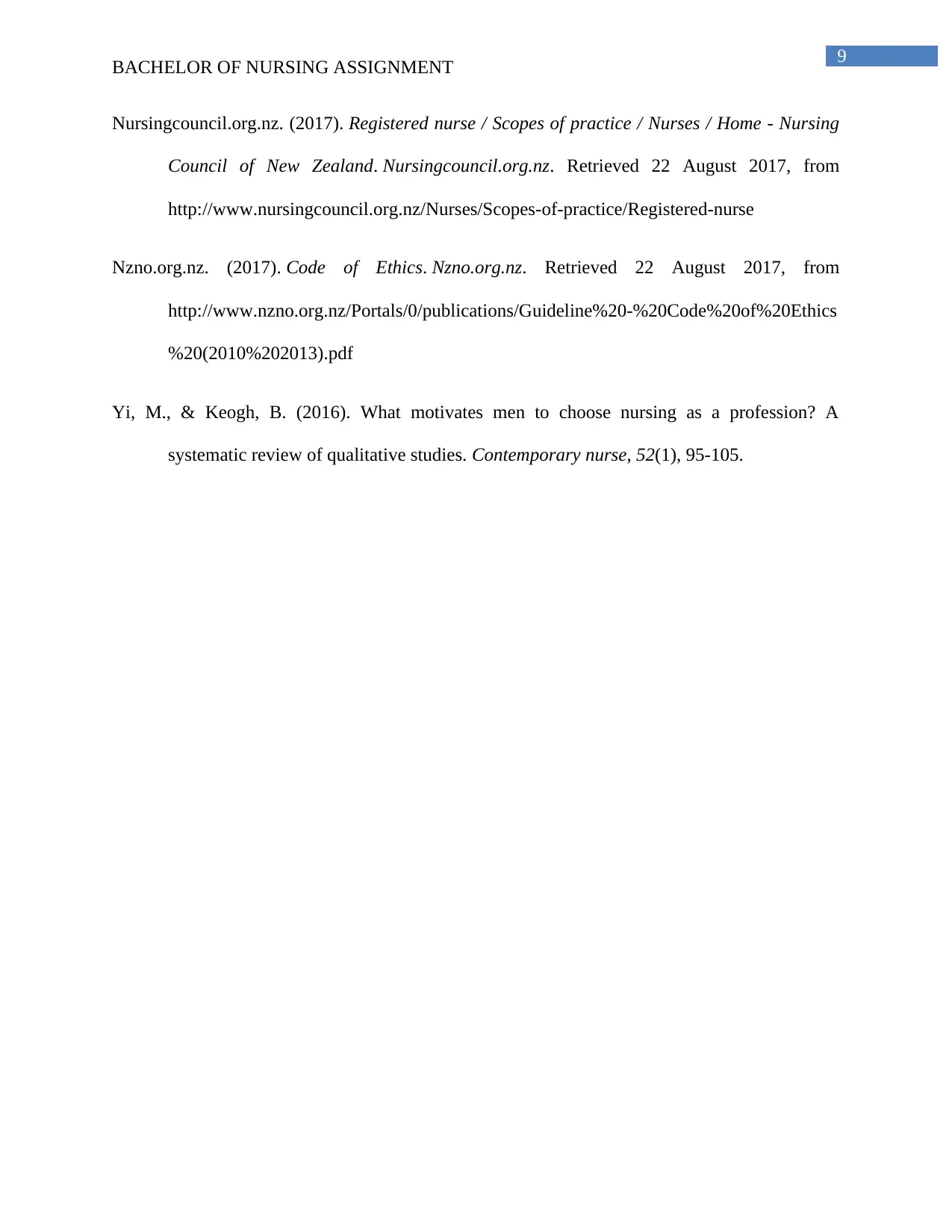
9
BACHELOR OF NURSING ASSIGNMENT
Nursingcouncil.org.nz. (2017). Registered nurse / Scopes of practice / Nurses / Home - Nursing
Council of New Zealand. Nursingcouncil.org.nz. Retrieved 22 August 2017, from
http://www.nursingcouncil.org.nz/Nurses/Scopes-of-practice/Registered-nurse
Nzno.org.nz. (2017). Code of Ethics. Nzno.org.nz. Retrieved 22 August 2017, from
http://www.nzno.org.nz/Portals/0/publications/Guideline%20-%20Code%20of%20Ethics
%20(2010%202013).pdf
Yi, M., & Keogh, B. (2016). What motivates men to choose nursing as a profession? A
systematic review of qualitative studies. Contemporary nurse, 52(1), 95-105.
BACHELOR OF NURSING ASSIGNMENT
Nursingcouncil.org.nz. (2017). Registered nurse / Scopes of practice / Nurses / Home - Nursing
Council of New Zealand. Nursingcouncil.org.nz. Retrieved 22 August 2017, from
http://www.nursingcouncil.org.nz/Nurses/Scopes-of-practice/Registered-nurse
Nzno.org.nz. (2017). Code of Ethics. Nzno.org.nz. Retrieved 22 August 2017, from
http://www.nzno.org.nz/Portals/0/publications/Guideline%20-%20Code%20of%20Ethics
%20(2010%202013).pdf
Yi, M., & Keogh, B. (2016). What motivates men to choose nursing as a profession? A
systematic review of qualitative studies. Contemporary nurse, 52(1), 95-105.
1 out of 10
Related Documents
Your All-in-One AI-Powered Toolkit for Academic Success.
+13062052269
info@desklib.com
Available 24*7 on WhatsApp / Email
![[object Object]](/_next/static/media/star-bottom.7253800d.svg)
Unlock your academic potential
Copyright © 2020–2026 A2Z Services. All Rights Reserved. Developed and managed by ZUCOL.





